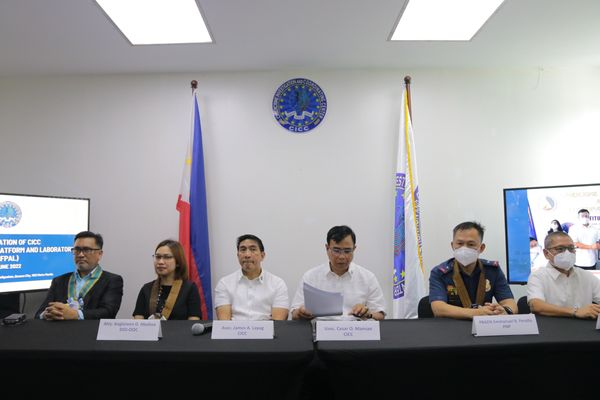“We need to continually fight all forms of cybercrime, especially online sexual crimes against children. The DFPAL is our contribution to meet this objective,” Cybercrime Investigation and Coordinating Center (CICC) Executive Director Cezar O. Mancao II said at the launch of the Digital Forensics Platform and Laboratory (DFPAL) in Quezon City.
Housed in the CICC headquarters in Quezon City, the state-of-the-art DFPAL the most modern and comprehensive digital forensics laboratory in the country now. Though law enforcement and military agencies have their own digital forensics teams and laboratories, the DFPAL is the first one that coordinates and consolidates all actions to detect and solve cybercrimes.
“The CICC’s DFPAL was established and operationalized to conduct relentless, coordinated efforts to prevent, disrupt, and possibly stop if not mitigate the issues of OSAEC through the collaborative partnership of local and international stakeholders towards providing a cybersafe environment for children,” Mancao explains.

Initially, the DFPAL is investigating and fighting Online Sexual Abuse and Exploitation of Children (OSAEC). This is the first step in the many tasks the laboratory is mandated to do. Aside from OSAEC, fake news, mis- and disinformation, smishing, phishing, online gambling, fintech, and money scams are also in the laboratory’s crosshairs.
“The opening of DFPAL will allow the CICC to monitor and coordinate with other law enforcement agencies in conducting thorough digital and forensic investigations and assist them in prosecuting cybercriminals nationwide,” Mancao says.
The CICC has already implemented several programs on national and local levels, directly with schools and establishments and even with parents. Examples of these projects are the Child Online Safeguarding Policy (COSP), Cyber Patrol Program, Batang Barangay Capability Program, and the Cyber Conflict Program, among others. We are also part of the Inter-Agency Council Against Child Pornography (IACACP) and the Inter-Agency Council against Trafficking (IACAT).
“We have acquired a powerful state-of-the-art technology, which will improve the success rates of investigators and policing operations in the ongoing pursuit to identify, apprehend, and convict individuals and networks associated with online child sexual exploitation,” Mancao emphasizes.
Technology is only one part of the strengths of the DFPAL. It relies heavily on the talent and experience of trained and certified professionals from various fields such as information, and communications technology, psychology, digital forensics, data analytics, research, and communications.
 Linus Antonio, a security consultant for the CICC highlighted how victimizing children oftentimes by their own parents were aggravated during the COVID-19 pandemic. Having kids contained at home aggravated the problem of online child exploitation specifically in low-income families.
Linus Antonio, a security consultant for the CICC highlighted how victimizing children oftentimes by their own parents were aggravated during the COVID-19 pandemic. Having kids contained at home aggravated the problem of online child exploitation specifically in low-income families.
Parents or guardians of victimized children claim that because of online exposure of children the “no hold and no-touch” concept applies and this was not online sexual abuse. Sociologists and psychologists however agree that involving children in any form of exposure of their body or private parts for financial or commercial gain is an extreme form of exploitation. This kind of pornography is the most abhorrent king and is proven to have long-term effects on children.
Cybersecurity expert Angel Redoble, PLDT chief information security advisor explained how PLDT-Smart has systematized detection and blocking of illicit URLs by preventing end-user attempts to access barred online exploitation sites.
“Smart and PLDT’s partnership with Canadian Centre for Child Protection and Internet Watch Foundation allows the collection and conversion of URLs down to their DNS. This dedicated solution uses dynamic intelligence data,” Redoble explained.
When asked about privacy issues, Atty. Angiereen Medina of the DOJ explained that though some of the techniques used in the detection of online sexual child abuse may sound or appear to be intrusive, these are in fact, privacy policy compliant.
“The methods being used follow the privacy laws and in fact enhance it because it premises on the fact that criminals cannot hide behind privacy,” Medina said.
“OSAEC is a tragic and growing problem in the Philippines, but it does not need to be a permanent one. We will do everything that we can to protect Filipino children. We have to act now and fight against these monster predators. We need to help each other to protect our netizens. To support this advocacy, we have child online protection programs and initiatives in partnership with various civil society organizations and many stakeholders,” Mancao said as he concluded the launch activities.
The CICC was created by virtue of Republic Act 10175, also known as the Cybercrime Prevention Act of 2012, for policy coordination among concerned agencies. It is one of the attached agencies of the Department of Information and Communications Technology (DICT) tasked to lead the government’s efforts in the fight against cybercrimes.






